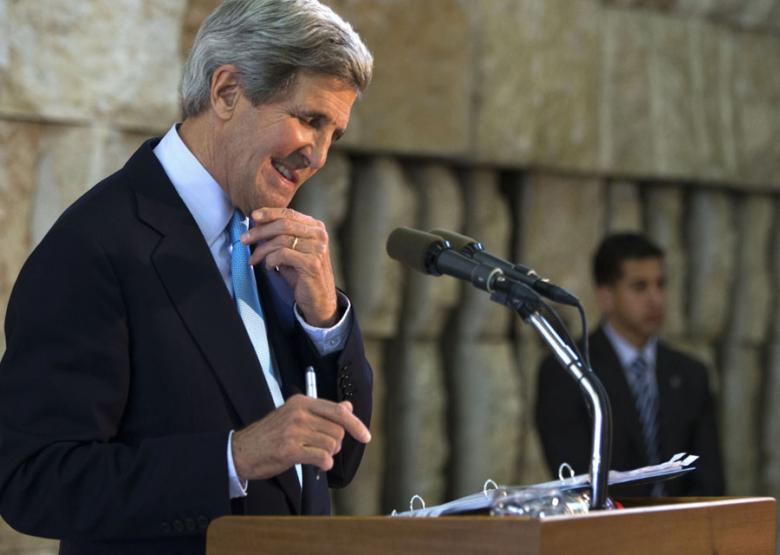I wonder what it is that other people see about Secretary of State John Kerry’s Israeli-Palestinian breakthrough that I’m missing.
The fundamentals haven’t changed. The Palestinian Authority’s goal is to achieve a peace agreement with Israel in which it (again) recognizes Israel and Israel agrees to the establishment of a Palestinian state in the occupied territories of the West Bank (including east Jerusalem) and Gaza.
This has been the Palestinian position since the Oslo Agreement of 1993, the one that produced the famous handshake between Yitzhak Rabin and Yasir Arafat. The Palestinians have never changed their position. They insist on taking possession of 100 percent of those occupied territories, with “land swaps” that will permit a few settlement blocs to stay under Israeli jurisdiction in exchange for equal acreage now inside Israel.
| Why would the Palestinians trust the U.S.? The answer is they don’t and they shouldn’t because, during two presidencies in a row, we have made not the slightest attempt to play “honest broker.” We remain “Israel’s lawyer.” |
It should be noted that 100 percent of the West Bank and Gaza represents only 22 percent of historic Palestine (Israel plus the West Bank and Gaza). Israel would still control 78 percent.
That is important to remember when you read a report that Palestinians are being obstinate for not agreeing to accept, say, 90 percent. That is because it is actually 90 percent of the 22 percent, which would reduce their portion to 18 percent.
The Palestinian position has been consistent since the days of Arafat. And even Hamas has endorsed it in its more realistic moments.
But no Israeli government has ever agreed to the 78-22 percent deal, certainly not Binyamin Netanyahu’s (Ehud Olmert came closest but it was at the very end of his term and the Palestinians knew that he couldn’t deliver).
On the contrary, Netanyahu says that he will never yield any part of Jerusalem, that although he would conceivably grant Palestinians 90 percent of the West Bank, he would insist on the presence of Israeli forces on a demilitarized Palestinian state’s border with Jordan and even on retaining Ariel, the Israeli city deep in the West Bank.
Additionally, he would keep Ma’aleh Adumim, a huge settlement a few miles from Jerusalem and fill the (E-1) corridor which separates it from Jerusalem with 3,000 settler homes to permanently divide the northern West Bank from the southern part.
Nothing that Kerry or any Israeli official has said since the “breakthrough” indicates that Netanyahu has changed these positions.
And the Palestinians, rightly, will never accept them. After all, they have considerably compromised from their pre-Oslo demand for the return of all of Palestine to 22 percent of it. They have recognized Israel’s right to security and, even without a peace treaty, work hand-in-hand with the Israeli Defense Forces to defend Israel. Additionally, under international law, the occupied territories are just that—occupied—and must be returned to them.
What are they supposed to compromise on?
They have nothing to give to Israel except an enhancement of the security guarantees they already do. Netanyahu likes to say he will not sacrifice Israel’s security for any peace agreement. But he knows he will never be asked to. Every significant proposal for Israeli-Palestinian peace contains extensive security guarantees for Israel. Notably, the Palestinians, who are infinitely weaker than Israel, don’t demand security guarantees, just their territory.
|
83¢ an issue is our unconscionably low introductory rate. Subscribe now! |
There is one last point as to why Kerry’s agreement will go nowhere. The Palestinians cannot trust the U.S. to be an impartial mediator. Even beyond the fact that the U.S. official expected to be chosen as mediator, Martin Indyk, was long affiliated with AIPAC (he and I worked together at AIPAC in the 1980s) and with the think-tank it created, the Washington Institute for Near East Policy, is the fact that the U.S. has unambiguously taken Israel’s side for decades.
The Palestinians understand the role of the Israel lobby in keeping Congress in line, with Congress doing the job of making sure the administration doesn’t stray. As recently as 2012, the U.S. led the opposition to a resolution granting Palestine observer status at the United Nations (only seven countries voted with us). In March of this year, President Obama visited Israel to deliver, both in words and symbolic actions, the message that the United States and Israel were essentially one, a vivid demonstration of Vice President Biden’s oft-repeated pledge that there must be “no daylight, no daylight” between U.S. and Israeli policies.
Exactly why would the Palestinians trust the U.S.? The answer is they don’t and they shouldn’t because, during two presidencies in a row, we have made not the slightest attempt to play “honest broker.” We remain even more “Israel’s lawyer” than we were when Clinton-era negotiator, Aaron Miller used the term to describe our modus operandi.
The bottom line is that the Kerry initiative is dead even before arrival.
And, sad to say, that is how it should be until the U.S. looks at Palestinian and Israeli demands, side by side, and decides, honestly, that there is no moral equivalence between the demands of the occupier and the occupied. And then we can, just possibly, help deliver peace and security for Israelis and Palestinians. But not before.
M.J. Rosenberg is a Special Correspondent for The Washington Spectator. He was most recently a Foreign Policy fellow at Media Matters For America. Previously, he spent 15 years as a Senate and House aide. Early in his career he was editor of AIPAC’s newsletter Near East Report. From 1998-2009, he was director of policy at Israel Policy Forum. Follow him @MJayRosenberg.




0 Comments